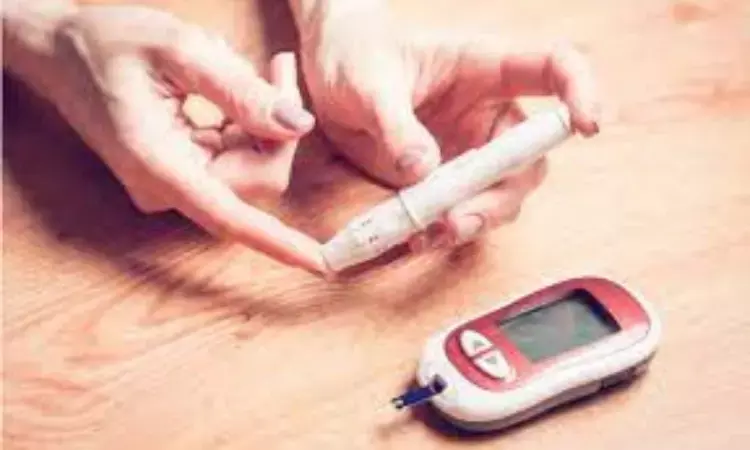- Home
- Medical news & Guidelines
- Anesthesiology
- Cardiology and CTVS
- Critical Care
- Dentistry
- Dermatology
- Diabetes and Endocrinology
- ENT
- Gastroenterology
- Medicine
- Nephrology
- Neurology
- Obstretics-Gynaecology
- Oncology
- Ophthalmology
- Orthopaedics
- Pediatrics-Neonatology
- Psychiatry
- Pulmonology
- Radiology
- Surgery
- Urology
- Laboratory Medicine
- Diet
- Nursing
- Paramedical
- Physiotherapy
- Health news
- Fact Check
- Bone Health Fact Check
- Brain Health Fact Check
- Cancer Related Fact Check
- Child Care Fact Check
- Dental and oral health fact check
- Diabetes and metabolic health fact check
- Diet and Nutrition Fact Check
- Eye and ENT Care Fact Check
- Fitness fact check
- Gut health fact check
- Heart health fact check
- Kidney health fact check
- Medical education fact check
- Men's health fact check
- Respiratory fact check
- Skin and hair care fact check
- Vaccine and Immunization fact check
- Women's health fact check
- AYUSH
- State News
- Andaman and Nicobar Islands
- Andhra Pradesh
- Arunachal Pradesh
- Assam
- Bihar
- Chandigarh
- Chattisgarh
- Dadra and Nagar Haveli
- Daman and Diu
- Delhi
- Goa
- Gujarat
- Haryana
- Himachal Pradesh
- Jammu & Kashmir
- Jharkhand
- Karnataka
- Kerala
- Ladakh
- Lakshadweep
- Madhya Pradesh
- Maharashtra
- Manipur
- Meghalaya
- Mizoram
- Nagaland
- Odisha
- Puducherry
- Punjab
- Rajasthan
- Sikkim
- Tamil Nadu
- Telangana
- Tripura
- Uttar Pradesh
- Uttrakhand
- West Bengal
- Medical Education
- Industry
GlucoCheck- Novel non-invasive blood sugar monitoring process may ease testing in diabetes patients

USA: Researchers have developed a non-invasive process GlucoCheck, that can identify exact value of blood glucose with 90% accuracy without taking a blood sample.
The testing process uses light shone through human tissue, in either the ear or finger, and a small camera to capture images on the other side. Then, a model is used to study the amount of light absorption in those images to determine glucose concentration.
As a child, Valero witnessed her diabetic father prick his finger several times a day to draw blood and check his glucose levels using an electronic monitor. She was concerned about the invasive and painful process but was also curious about the technology behind the device.
"After watching my father go through that, I wanted to create something less invasive," said Valero.
The assistant professor of information technology in Kennesaw State's College of Computing and Software Engineering (CCSE) and director of KSU's Iot as a Service Research Group is working to improve the glucose monitoring process for the millions of people around the world affected by diabetes.
"Our pilot study was very successful," she said. "We are excited about how this device will help people with diabetes, which affects about one in every 10 people in the United States."
Valero and her team recently filed a provisional patent application with the U.S. Patent and Trademark Office to protect the process they created. Director of Kennesaw State's Office of Intellectual Property Development Chris Cornelison helped Valero sift through research projects around the world to make sure the GlucoCheck process is unique and patentable.
"The way we gather and output the data is novel, and we will continue to work on ways to improve the glucose estimation model," Valero said. The team has tested the process on nearly 50 people so far, but before filing a full patent next summer, they will assess how the process works on people with a range of skin pigmentations and skin thickness.
Valero's students have already created a mobile phone application and are working on connecting GlucoCheck to Amazon's virtual assistant, Alexa.
"I am very fortunate to have great students who are extremely motivated and bring a wealth of knowledge to this project," Valero said. "Watching them grow as researchers who want to make a difference in the world using technology is very rewarding."
According to Paola Spoletini, interim associate dean of CCSE, Valero's commitment to her research is compounded by her dedication to her students.
"Dr. Valero is passionate about using technology to make a difference in the world, and she is an incredible asset to our College," Spoletini said. "Not only is she developing cutting-edge technologies, but she also serves as a mentor and role model to her students."
In addition to her students, Valero has worked closely with Hossain Shahriar, associate professor of information technology, and Katherine Ingram, associate professor of exercise science. Ingram is currently researching gestational diabetes risk, and Shahriar's research focuses on health information technology, data analytics and cybersecurity. Their paper detailing the pilot study was recently accepted into the Journal of Medical Internet Research, and Valero has used the data to apply for additional funding.
Reference:
Maria Valero, Priyanka Pola, Oluwaseyi Falaiye, Katherine H Ingram, Liang Zhao, Hossain Shahriar, Sheikh Iqbal Ahamed, PMCID: PMC9463623 DOI: 10.2196/38664
Dr Kamal Kant Kohli-MBBS, DTCD- a chest specialist with more than 30 years of practice and a flair for writing clinical articles, Dr Kamal Kant Kohli joined Medical Dialogues as a Chief Editor of Medical News. Besides writing articles, as an editor, he proofreads and verifies all the medical content published on Medical Dialogues including those coming from journals, studies,medical conferences,guidelines etc. Email: drkohli@medicaldialogues.in. Contact no. 011-43720751


